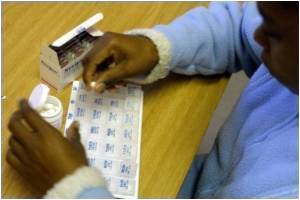
In 2009 it accounted for 20 percent of international public funding for HIV, 65 percent for TB, and 65 percent for malaria.
But a scandal last year in which millions of dollars went missing, combined with the economic crisis, have rattled the widely-praised organisation.
This week the fund announced a leadership change "to meet the new challenges of our second decade".
"Our focus is shifting from an emergency response," to being a "sustainable and efficient channel for funding to fight AIDS, TB and malaria," it said following Tuesday's announcement that embattled head Michel Kazatchkine was to step down.
In November, the fund said it would not bankroll new AIDS treatment projects until 2014 because the world financial crisis had curtailed donor country spending.
Advertisement
"These are tough economic times, but that is no excuse for cutting aid to the world?s poorest," Gates said in making the announcement.
Advertisement
Since 2002, the fund has disbursed some 15 billion dollars and is currently saving some 100,000 lives a month, by its own estimate.
In the battle against HIV/AIDS, it has over that period provided antiretroviral treatment to more than 3.3 million people.
It has also detected and treated 8.2 million people with tuberculosis, and provided 230 million bed nets to families to prevent malaria.
Part of its mandate is to provide grants for projects in developing nations, allocating money provided by governments and supporters, notably the Bill and Melinda Gates Foundation.
Yet the fund has also faced controversies.
In February last year it announced it was beefing up its financial safeguards after auditors found that $34 million (25 million euros) had gone missing or been siphoned off in four African countries, leading donor Germany to suspend payments.
On Tuesday the fund announced that Kazatchkine, a French clinician and health advocate, was stepping down.
He said his decision was triggered by a management reshuffle and planned spending cuts, and dismissed as unfounded allegations in the French media suggesting favouritism in the funding of an AIDS awareness project supported by Carla Bruni-Sarkozy, the wife of French President Nicolas Sarkozy.
Colombian native and Brazilian citizen Gabriel Jaramillo will take up a 12-month managerial post on February 1.
Since his retirement as Sovereign Bank CEO in January last year, Jaramillo has served as an advisor to the Office of the Special Envoy for Malaria of the United Nations secretary-general.
Praise for the fund came from Australian lawyer Peter Prove, heads of the Geneva-based faith-backed Ecumenical Advocacy Alliance, which battles against HIV/AIDS stigmatisation.
"We have enormous respect for the transparency with which the Global Fund has identified, and is seeking to address, misuse and corruption related to its funding," Prove told AFP.
The sense of emergency that enveloped the Fund after the revelations has passed, he said.
"But the fight is not yet won, and the global HIV response will, for the time being, need continuing and increasing support," he added.
UNAIDS says that although new infections show signs of declining, 34 million people were living with HIV at the end of 2010.
Source-AFP













